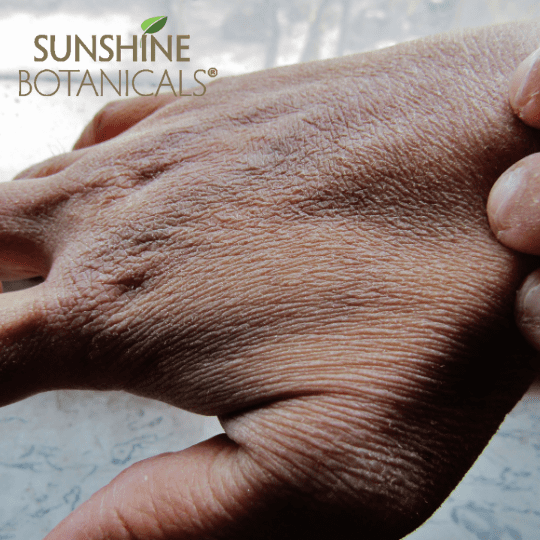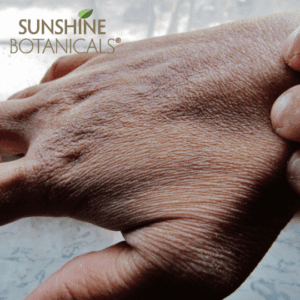The Problem:
Rough, Coarse Skin Texture: The skin may experience changes in texture as it grows older, resulting in a rough and bumpy complexion. The degradation of elastin and collagen, lack of moisture, and buildup of dead skin cells from a slower cellular turnover all contribute to this shift in texture. Lack of daily exfoliation and proper hydration is a major contributing factor.
Brown Spots and Sun Damage: Ultraviolet (UV) light and exposure to sunlight age your skin more quickly than it would age naturally. The result is called photoaging, and it’s responsible for 90% of visible changes to your skin.
Lines and Wrinkles: Here’s the deal: dry skin and the aging process doesn’t cause wrinkles. The reason why this is a common misconception is that dry skin can accentuate common skin problems related to aging. Wrinkling, creping, sagging and flaking appear exaggerated because the skin lacks moisture. Most people over-moisturize and under-exfoliate the skin – this is where wrinkles and blotchy skin begin. If you exfoliate properly (dry brush daily!), it will eliminate dry, dead cells, and moisturizing with great skin-firming ingredients can get into the skin, so skin looks firmer and plumper.
Redness and Inflammation: Too often, skin redness and inflammation can be present alongside sun damage, discoloration, and hyperpigmentation. In fact, inflammation is the root cause of aging both on the skin and in the body, and when it comes to treating aging body skin, ingredients are everything! Seaweed, Red Algae and Niacinamide are some of the most effective skin-brightening and anti-inflammatory ingredients you can get to treat aging skin.
Sun Damage: Ultraviolet (UV) light and exposure to sunlight age your skin more quickly than it would age naturally. The result is called photoaging, and it’s responsible for 90% of visible changes to your skin.
Chlorine: Chlorine strips away essential oils from your skin and opens your skin’s pores, causing dry skin. Daily exposure to chlorine can cause rashes on your skin which can turn into blisters if they come into further contact with chlorine. Chlorine protects you from the harmful bacteria that can grow in swimming pools but soaking in the stuff for too long takes its toll: The chemical strips your hair and skin of the natural oils in charge of keeping damage out and moisture in, leaving your skin dry, itchy, flaky, and sensitive, and your hair and nails dry and brittle. Add a water filter to your shower, so you are not soaking in this toxic chemical as you bathe daily!
Diet: Sugar damages your skin through a natural process called glycation. The sugar in your bloodstream attaches to proteins and produces harmful free radicals called advanced glycation end products (AGEs). As AGEs accumulate (the more sugar you eat, the more they develop), they damage the proteins around them, causing the skin to wrinkle and “browning of the skin,” commonly known as hyperpigmentation.

